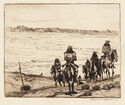
19th, 20th & 21st Century Fine Prints
707-546-7352 · fax 707-546-7924 · web: www.annexgalleries.com · email: artannex@aol.com
Edward Borein Biography
Edward Borein
American
1873-1945
Biography
John Edward Borein (1873-1945), painter, etcher, illustrator, writer, and cowboy, was born in rural San Leandro, California. As a boy, Borein was fascinated by the colorful cowboys who drove herds to the local cattleyards. Showing a natural talent for drawing, his parents enrolled him at the San Francisco Art Institute where his classmates were Maynard Dixon and Jimmy Swinnerton. He left after only a month, preferring the rigorous life of a vaquero.
Working on numerous ranches in California, he eventually made his way to Mexico all the while recording the life of the west. Borein’s sketches were published as early as 1896 in Land of Sunshine which was edited by Charles Lummis. Returning to Oakland via New Mexico and Arizona, Borein was hired as a staff artist for the San Francisco Call. In 1901 he and Dixon explored and sketched the Sierra, Oregon, and Idaho and Borein revisited Mexico in 1903.
He established a studio in the theatrical district of New York in 1908 but maintained a periodical circuit between Oakland and New York. A successful illustrator, Borein’s work was featured in Sunset, Century, Harper’s, Collier’s and Western World. Ernest Roth and Childe Hassam influenced him to begin etching in 1911 and by 1914 he was enrolled at the Art Students League, studying etching with Vojtech Preissig.
Borein returned to Oakland in 1919, married at the home of Charles Lummis in Los Angeles, and settled permanately in Santa Barbara where he built a Hopi-style house near his Carl Oscar Borg and taught at the Santa Barbara School of the Arts.
He was a member of the Brooklyn Society of Etchers, Santa Barbara Art Club, Society of American Etchers, and the Printmakers Society of California. Borein is represented in the collections of the Oakland Museum, the Library of Congress, the Cowboy Hall of Fame, and the New York Public Library.

